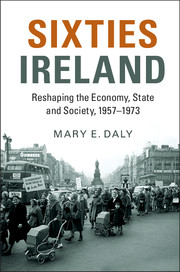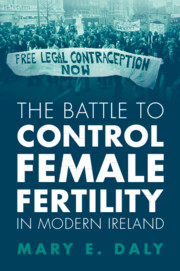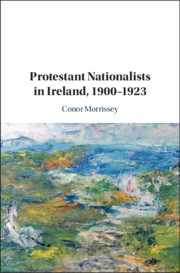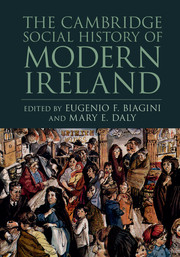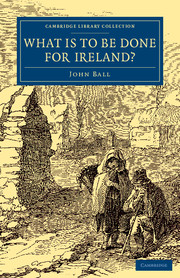Sixties Ireland
Reshaping the Economy, State and Society, 1957–1973
- Author: Mary E. Daly, University College Dublin
- Date Published: March 2016
- availability: Available
- format: Paperback
- isbn: 9781316509319
Paperback
Other available formats:
Hardback, eBook
Looking for an inspection copy?
This title is not currently available on inspection
-
This provocative new history of Ireland during the long 1960s exposes the myths of Ireland's modernisation. Mary E. Daly questions traditional interpretations which see these years as a time of prosperity when Irish society – led by a handful of key modernisers – abandoned many of its traditional values in its search for economic growth. Setting developments in Ireland in a wider European context, Daly shows instead that claims for the economic transformation of Ireland are hugely questionable: Ireland remained one of the poorest countries in western Europe until the end of the twentieth century. Contentious debates in later years over contraception, divorce, and national identity demonstrated continuities with the past that long survived the 1960s. Spanning the period from Ireland's economic rebirth in the 1950s to its entry into the EEC in 1973, this is a comprehensive reinterpretation of a critical period in Irish history with clear parallels for Ireland today.
Read more- The first comprehensive examination of this crucial period in the history of modern Ireland
- Presents an integration of the social, economic and political forces that shaped or hindered change, allowing Ireland to take its place in the growing international historiography of the 1960s
- Gives primacy to the economy and society, rather than an account dominated by politics and political personalities
Reviews & endorsements
'With an unsparing ability to distinguish myth from reality, Mary Daly reveals why Ireland, despite some impressive growth in the 1960s, remained one of the poorest countries in Europe. Deeply relevant to the economic, political, and religious questions confronting Ireland today, this book will provoke a lively response.' Kevin Kenny, Boston College, Massachusetts
See more reviews'Based on an awe-inspiring array of evidence, this is a tour de force that transforms the way we think of Ireland's 'modernisation'. Mary Daly's brilliant analysis will be essential reading for anyone interested in understanding how a fast-growing, dynamic and open society could emerge from the chrysalis of De Valera's Ireland.' Eugenio F. Biagini, University of Cambridge
'This is a history of 'the long 1960s' - from the beginning of Whitaker's work on Economic Development and de Valera's departure from active politics to the explosion of the Northern troubles and Ireland's accession to the EEC. Rising living standards, external events and the encroachment of 'the modern' inevitably forced change. This book is an invaluable documentation of how traditional values, core institutions and vested interests continued to shape these changes.' Frank Barry, Trinity College Dublin
'This is a book about transition that provides a compelling narrative about the evolution of Ireland though the long 1960s. The volume brings patterns of continuity, not just change, sharply into focus. Mary Daly is to be commended for its breath - the Irish economy, politics, media, urban-rural relations, family dynamics, and emigration are all treated in a penetrating and subtle manner. As Ireland prepares for the centenary of its 'founding act', the 1916 rebellion, this volume makes a major contribution to our understanding of the Ireland that we have.' Brigid Laffan, European University Institute, Florence
'Sixties Ireland is great history. It questions, challenges and reinterprets … Anyone who is interested in why [Ireland] is as it is needs to read this book.' Dan O'Brien, Irish Independent (independent.ie)
'Sixties Ireland is a fine book and significantly advances our knowledge and understanding of this period in Irish history.' Eoin O'Broin, Sunday Business Post
'A valuable study based on the author's own extensive archival research and synthesis of many recent books and articles by other historians … Highly recommended. Upper-division undergraduates and above.' A. H. Plunkett, Choice
'Working through the key themes of economic development, emigration, women's lives and feminism, and finally on to political change and the upheavals caused by violence in Northern Ireland, [Daly] provides a detailed exploration of the decade which goes beyond any previous book in both its scope and detail. … This book is essential reading for anyone who wishes to make sense of the pivotal, transformational decade. Moreover, it also shines a light on just how much more there is to understand with regard to this period, and as such should provide a fruitful starting point for future research.' Erika Hanna, Twentieth Century British History
Customer reviews
Not yet reviewed
Be the first to review
Review was not posted due to profanity
×Product details
- Date Published: March 2016
- format: Paperback
- isbn: 9781316509319
- length: 442 pages
- dimensions: 231 x 153 x 24 mm
- weight: 0.63kg
- availability: Available
Table of Contents
Introduction
Part I. The Economy:
1. 'Bringing up the rear of the pack' in Europe's golden age of economic growth
2. Transforming the economy: whose plan?
3. Coping with change 1: industry and trade unions
4. Coping with change 2: agriculture and rural Ireland
5. Coping with change 3: regional and physical planning
Part II. Society:
6. The optimism of a rising tide
7. Farewell to 'the vanishing Irish'
8. Women, children and families
9. Second-wave feminism and the Irish family
10. The churches
11. Education, health and welfare
Part III. Politics and International Relations:
12. Party politics: the revolution that never happened
13. International relations
14. Northern Ireland
Conclusion: abandoning the past?
Bibliography
Index.
Sorry, this resource is locked
Please register or sign in to request access. If you are having problems accessing these resources please email [email protected]
Register Sign in» Proceed
You are now leaving the Cambridge University Press website. Your eBook purchase and download will be completed by our partner www.ebooks.com. Please see the permission section of the www.ebooks.com catalogue page for details of the print & copy limits on our eBooks.
Continue ×Are you sure you want to delete your account?
This cannot be undone.
Thank you for your feedback which will help us improve our service.
If you requested a response, we will make sure to get back to you shortly.
×
